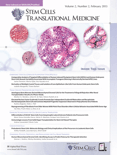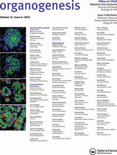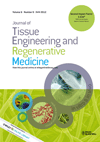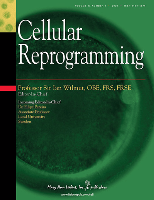
STEM CELLS
Scope & Guideline
Pioneering research for tomorrow's medical innovations.
Introduction
Aims and Scopes
- Stem Cell Applications in Regenerative Medicine:
The journal extensively covers the use of stem cells for regenerative therapies, including applications in tissue and organ repair, such as dentin-pulp regeneration and treatment of diseases like chronic limb ischemia. - Mechanistic Insights into Stem Cell Biology:
Research published in the journal delves into the fundamental biology of stem cells, including differentiation pathways, signaling mechanisms, and the role of stem cells in various physiological and pathological processes. - Innovative Stem Cell Technologies:
The journal highlights advancements in stem cell technologies, such as CRISPR for gene editing, novel scaffolding techniques for tissue engineering, and the use of biomaterials to enhance stem cell function. - Clinical Trials and Translational Research:
A significant focus is placed on clinical applications of stem cells, including the outcomes of clinical trials and studies that bridge laboratory discoveries with patient care. - Interdisciplinary Approaches to Stem Cell Research:
The journal promotes interdisciplinary studies that integrate insights from genetics, immunology, and bioengineering to further the understanding and application of stem cells in health and disease.
Trending and Emerging
- Stem Cell Therapy for Neurodegenerative Diseases:
Recent publications have highlighted the potential of stem cell therapies in treating neurodegenerative conditions, such as age-related hearing loss and other neurological disorders, emphasizing the therapeutic promise of stem cells in restoring function. - Application of Stem Cells in Wound Healing:
An increasing number of studies focus on the role of stem cells, particularly mesenchymal stem cells, in enhancing wound healing processes, showcasing their potential in treating chronic wounds and diabetic ulcers. - Immunomodulatory Properties of Stem Cells:
Research is trending towards understanding the immunomodulatory effects of stem cells, particularly in the context of inflammatory diseases and conditions like COVID-19, which could lead to novel therapeutic strategies. - Integration of Biomaterials and Stem Cells:
There is a growing interest in combining biomaterials with stem cell therapies for enhanced tissue engineering applications, indicating a trend towards developing sophisticated scaffolds that support stem cell function and integration. - Focus on Aging and Stem Cells:
Emerging themes include the study of stem cells in the context of aging, particularly how age-related changes affect stem cell function and potential therapeutic implications for age-associated diseases.
Declining or Waning
- Traditional Stem Cell Sources:
There has been a noticeable decline in studies focusing on more traditional sources of stem cells, such as embryonic stem cells, as the field shifts towards more ethically viable and clinically applicable sources like induced pluripotent stem cells (iPSCs) and adult stem cells. - Basic Laboratory Techniques:
Research centered around basic laboratory techniques in stem cell culture and differentiation is less prevalent, possibly due to the maturation of these methodologies and a shift towards more complex applications and clinical implications. - Single-Cell Analysis of Stem Cells:
There seems to be a waning interest in single-cell analysis techniques in stem cell research, as the focus has shifted towards understanding the collective behavior of stem cell populations and their interactions within tissue environments.
Similar Journals

Stem Cells and Cloning-Advances and Applications
Fostering Collaboration in Cutting-Edge ResearchStem Cells and Cloning-Advances and Applications is a leading peer-reviewed journal dedicated to the dynamic fields of stem cell research and cloning technologies. Published by DOVE MEDICAL PRESS LTD in New Zealand since 2008, this Open Access journal ensures that groundbreaking findings are accessible to a global audience. With a focus on innovative applications and advancements in cellular biology, the journal plays a pivotal role in disseminating knowledge within the scientific community. The journal currently holds an impact factor that reflects its influence, with notable rankings in both Cell Biology and Medicine (Miscellaneous), showcasing its interdisciplinary relevance. Researchers, professionals, and students alike benefit from the journal’s wide-ranging contributions, covering critical topics from regenerative medicine to genetic research. With a commitment to fostering collaboration and encouraging discussion in these cutting-edge domains, Stem Cells and Cloning-Advances and Applications continues to be a vital resource for advancing scientific inquiry and application.

Cells, published by MDPI in Switzerland, is a leading open-access journal that has been disseminating groundbreaking research in the fields of Biochemistry, Genetics, and Molecular Biology since its inception in 2011. With an impressive E-ISSN of 2073-4409, the journal boasts a strong impact factor and ranks in the 84th percentile for Scopus ratings, underscoring its significance in advancing scientific knowledge. As a Q1-ranked journal in both 2023 and 2020, it serves as a premier platform for researchers, professionals, and students eager to explore innovative findings and methodologies. By providing unrestricted access to high-quality research, Cells plays a pivotal role in facilitating collaboration and inspiration within the global scientific community, making it an indispensable resource for anyone interested in cutting-edge discoveries in cellular biology.

Current Stem Cell Research & Therapy
Unraveling the Potential of Stem Cells for HealingCurrent Stem Cell Research & Therapy, published by Bentham Science Publishers Ltd, is a leading journal dedicated to advancing the field of stem cell research. With an ISSN of 1574-888X and an E-ISSN of 2212-3946, this journal has been a valuable resource since its inception in 2006 and continues to broaden its scope through 2024. Recognized in the Q2 quartile for Medicine (miscellaneous) and ranked in the 66th percentile among its peers, the journal plays a crucial role in disseminating high-quality, peer-reviewed research that explores both the therapeutic and biological implications of stem cells. Located in the United Arab Emirates, Current Stem Cell Research & Therapy embraces a global audience of researchers, professionals, and students, providing a vibrant platform for discourse and innovation. While the journal offers subscription-based access, it remains committed to enhancing the scientific community's understanding of stem cell therapy and its applications across various medical fields.

Stem Cells Translational Medicine
Empowering Researchers in the Stem Cell RevolutionStem Cells Translational Medicine, published by Oxford University Press, is a leading open-access journal that has been at the forefront of stem cell research since its launch in 2012. With an impressive impact across various categories, it occupies Q2 in Cell Biology and is highly recognized in Q1 for both Developmental Biology and Miscellaneous Medicine in 2023. Its strong Scopus rankings highlight its significance in the fields of Biochemistry, Genetics, and Molecular Biology, achieving an outstanding percentile ranking of 93rd in Developmental Biology. The journal provides a pivotal platform for researchers, professionals, and students to publish and access cutting-edge findings that contribute to the understanding and application of stem cell technology. With a commitment to disseminating high-quality scientific knowledge, Stem Cells Translational Medicine plays a vital role in advancing research and innovation within the rapidly evolving landscape of regenerative medicine.

Organogenesis
Innovating Insights into Organ Development.Organogenesis is a leading journal published by Taylor & Francis Inc, dedicated to advancing the field of developmental biology and regenerative medicine. With an ISSN of 1547-6278 and E-ISSN 1555-8592, this journal spans an extensive research scope that includes embryology, transplantation, and biomedical engineering, distinguishing itself as a crucial platform for researchers and practitioners alike. Its impact is reflected in its performance across various categories in 2023, earning Q3 rankings in Biomedical Engineering and Embryology, Q4 in Developmental Biology, and Q2 in Transplantation, showcasing its reputable standing among peer journals. Moreover, with Scopus rankings indicating strong positioning in the fields of medicine and biochemistry, Organogenesis is essential for those looking to publish or stay updated on pioneering research. The journal facilitates rigorous peer-review and offers a forum for disseminating innovative findings, making it an invaluable resource for academics, professionals, and students committed to understanding the complexities of organism development.

Stem Cell Research & Therapy
Unlocking the Potential of Stem Cells for TomorrowStem Cell Research & Therapy is an esteemed international journal published by BMC, specializing in the rapidly advancing fields of stem cell research and regenerative therapies. Since its inception in 2010, the journal has embraced an Open Access model, ensuring that vital research is readily accessible to a global audience. With a significant impact in the scientific community, it holds Q1 quartile rankings in prestigious categories such as Biochemistry, Genetics and Molecular Biology, Cell Biology, and Molecular Medicine, highlighting its critical role in promoting groundbreaking research. The journal’s high Scopus rankings—placing it in the top echelons of its fields—reflect its commitment to publishing high-quality, peer-reviewed studies that advance our understanding of stem cell biology and therapeutic applications. Aimed at researchers, healthcare professionals, and students alike, Stem Cell Research & Therapy is an indispensable resource for those dedicated to the exploration and innovation within this transformative area of science.

Stem Cells International
Empowering Knowledge in Regenerative BiologyStem Cells International is a premier open access journal published by HINDAWI LTD, focusing on the rapidly evolving field of stem cell research. With an ISSN of 1687-966X and E-ISSN 1687-9678, this journal has been a vital resource since its inception in 2010, showcasing innovative studies and breakthroughs up to 2024. Positioned in Q3 in Cell Biology and Q2 in Molecular Biology for 2023, as well as well-ranked in the Scopus database, the journal serves as an essential platform for researchers, professionals, and students dedicated to exploring the implications of stem cell technology in regenerative medicine and biological research. The open access model ensures wide accessibility, fostering collaboration and knowledge-sharing across the scientific community, making it a cornerstone in advancing the understanding and application of stem cell science.

CELLULAR & MOLECULAR BIOLOGY LETTERS
Illuminating Cellular Processes Through Open Access ResearchCELLULAR & MOLECULAR BIOLOGY LETTERS, published by BMC, is a premier open-access journal dedicated to disseminating high-quality research in the fields of Biochemistry, Cell Biology, and Molecular Biology. Established in 1996, the journal has emerged as a leader in its domain, boasting an impressive Q1 ranking across three critical categories as of 2023, reflecting its significant impact within the scientific community. With an ISSN of 1425-8153 and an E-ISSN of 1689-1392, it offers accessible research findings to a global audience, having been open access since 2013. Situated in the United Kingdom, at CAMPUS, 4 CRINAN ST, LONDON N1 9XW, the journal continues to serve as a vital resource for researchers, professionals, and students, contributing to advancements in the understanding of cellular and molecular processes. By providing a platform for original research, reviews, and short communications, CELLULAR & MOLECULAR BIOLOGY LETTERS plays a crucial role in fostering dialogue and collaboration within the scientific community.

Journal of Tissue Engineering and Regenerative Medicine
Empowering researchers with impactful insights in tissue engineering.Journal of Tissue Engineering and Regenerative Medicine, published by WILEY, stands as a pivotal platform in the fields of biomaterials, biomedical engineering, and regenerative medicine. With an ISSN of 1932-6254 and an E-ISSN of 1932-7005, this journal, based in the United Kingdom, has consistently delivered high-quality research since its inception in 2006, converging critical insights through 2024. With an impressive citation profile reflected in its Scopus rankings—specifically a rank of #58 in Medicine and #75 in Biomedical Engineering—the journal is acknowledged for its substantial impact, as demonstrated by its competitive quartile standings in 2023. Notably, it maintains a Q3 ranking in Biomaterials and Q2 in both Biomedical Engineering and Medicine (miscellaneous), showcasing its influence and relevance in the rapidly evolving interplay between engineering and medicine. The journal serves as a vital resource for researchers and practitioners aiming to stay abreast of innovations and breakthroughs in regenerative therapies, tissue scaffolds, and biomaterials. While not an open-access publication, it fosters academic dialogue and knowledge dissemination that is crucial for advancing the field.

Cellular Reprogramming
Innovating Cellular Biology for Tomorrow's SolutionsCellular Reprogramming is a prominent academic journal published by MARY ANN LIEBERT, INC, dedicated to advancing the field of cellular biology and biotechnology. With its ISSN 2152-4971 and E-ISSN 2152-4998, this journal provides an innovative platform for researchers and professionals to share groundbreaking research findings on cellular reprogramming, stem cell biology, and regenerative medicine. Established in 2010, and actively publishing until 2024, the journal is recognized for its contributions, evidenced by its categorizations in the Q3 and Q4 quartiles across several related fields, including biotechnology and developmental biology. This peer-reviewed journal not only supports open access to scientific literature but also aims to enhance interdisciplinary collaboration among scientists. With a growing impact in the realms of biochemistry, genetics, and molecular biology, Cellular Reprogramming remains an essential resource for the dissemination of pioneering research that could shape the future of cellular therapies.